外研版八年级英语上册Module 3 Sports.Unit 2教学课件(共32张PPT)
文档属性
| 名称 | 外研版八年级英语上册Module 3 Sports.Unit 2教学课件(共32张PPT) |
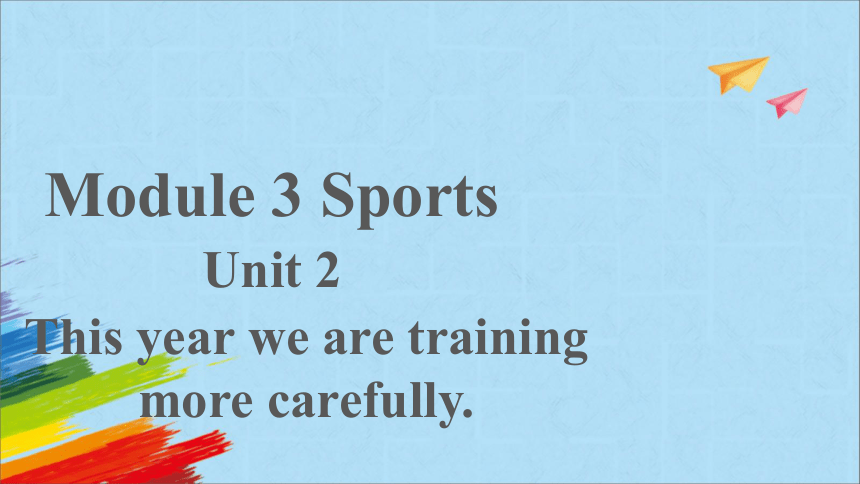
|
|
| 格式 | pptx | ||
| 文件大小 | 3.3MB | ||
| 资源类型 | 教案 | ||
| 版本资源 | 外研版 | ||
| 科目 | 英语 | ||
| 更新时间 | 2022-10-14 00:00:00 | ||
图片预览

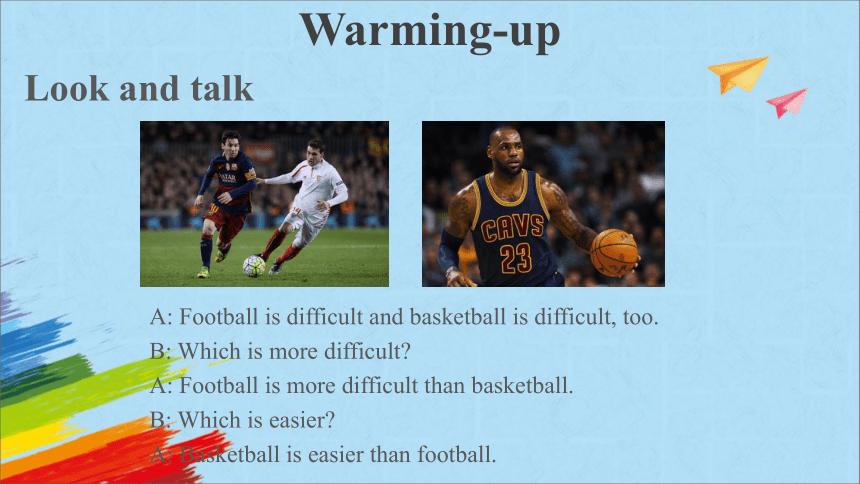
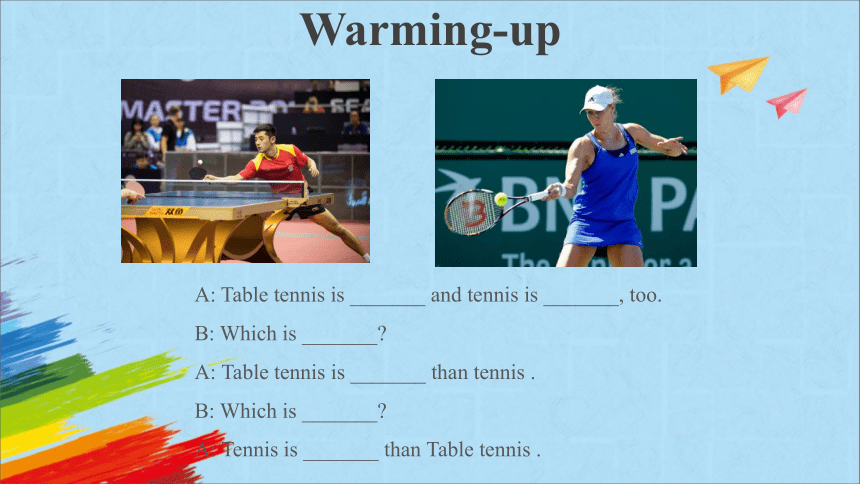
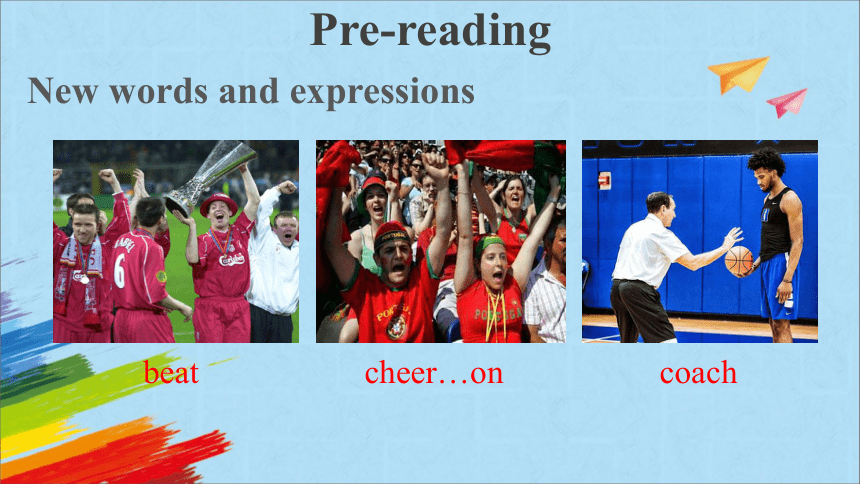
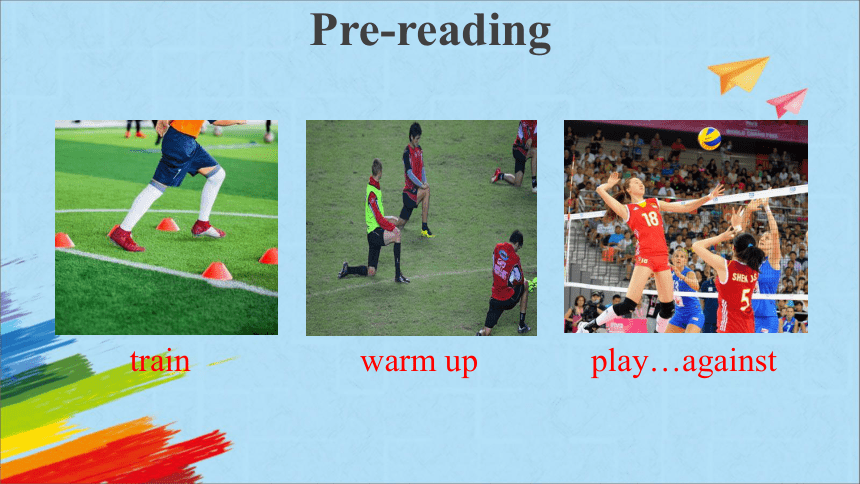
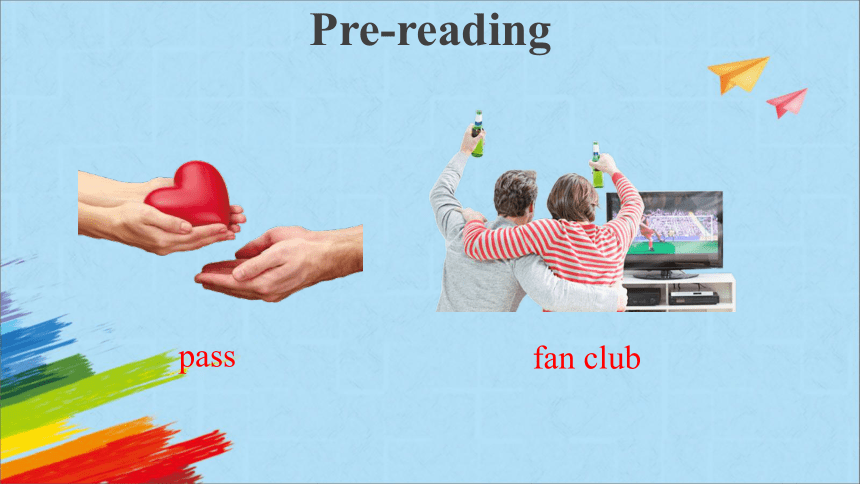
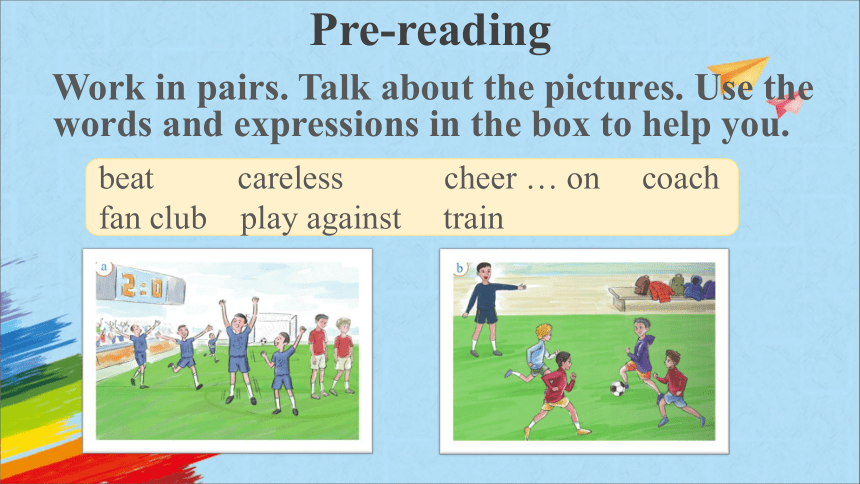

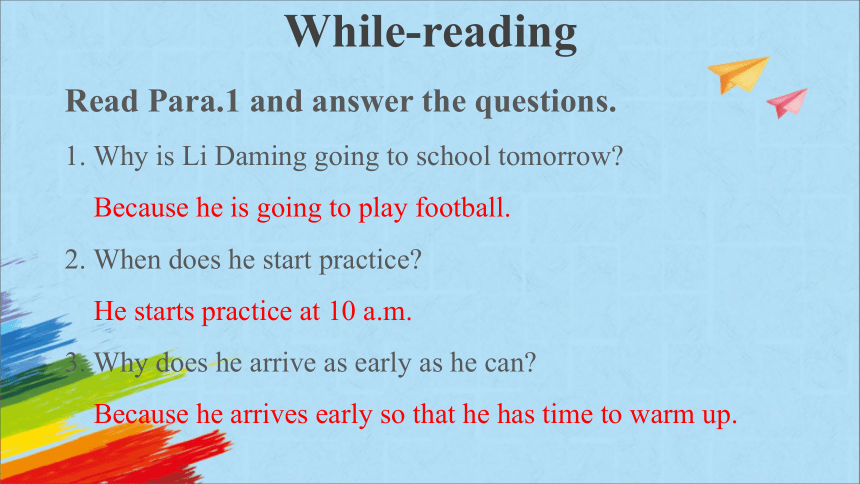
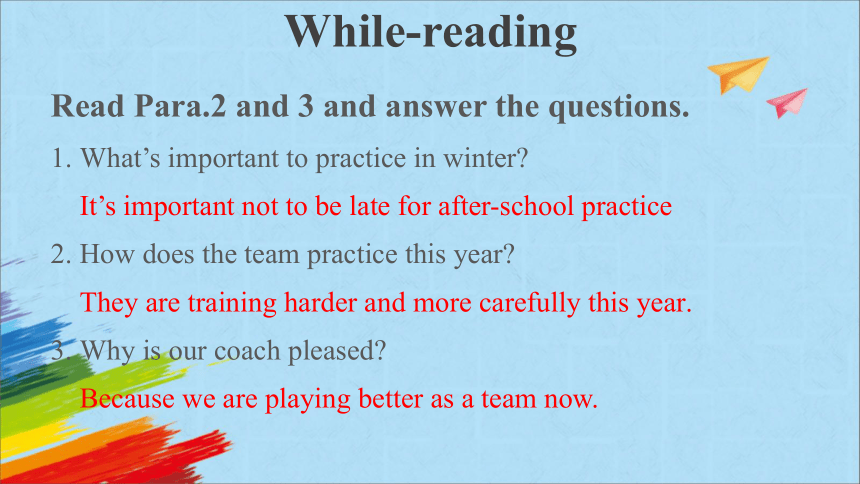
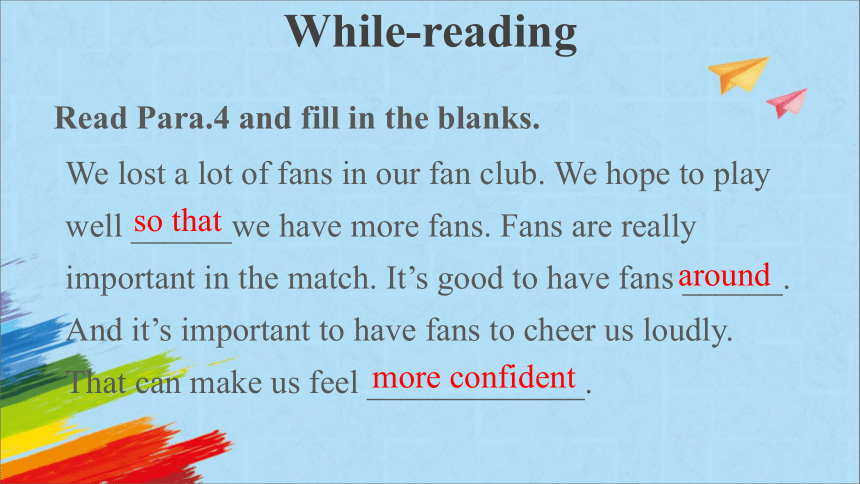
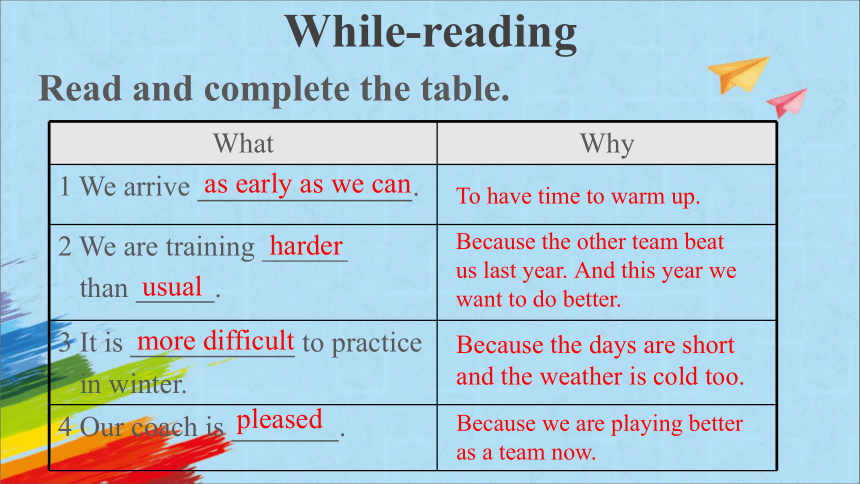
文档简介
(共32张PPT)
Module 3 Sports
Unit 2
This year we are training more carefully.
A: Football is difficult and basketball is difficult, too.
B: Which is more difficult
A: Football is more difficult than basketball.
B: Which is easier
A: Basketball is easier than football.
Look and talk
Warming-up
Warming-up
A: Table tennis is _______ and tennis is _______, too.
B: Which is _______
A: Table tennis is _______ than tennis .
B: Which is _______
A: Tennis is _______ than Table tennis .
Pre-reading
New words and expressions
beat
cheer…on
coach
Pre-reading
play…against
train
warm up
fan club
pass
Pre-reading
beat careless cheer … on coach fan club play against train
Work in pairs. Talk about the pictures. Use the
words and expressions in the box to help you.
Pre-reading
Read the passage and match each paragraph with the main idea.
Para. 1 A. It is more difficult to practice in winter.
Para. 2 B. The training of the school team
Para. 3 C. The fan club
Para. 4 D. They have a better chance of winning.
While-reading
Read Para.1 and answer the questions.
1. Why is Li Daming going to school tomorrow
Because he is going to play football.
2. When does he start practice
He starts practice at 10 a.m.
3. Why does he arrive as early as he can
Because he arrives early so that he has time to warm up.
While-reading
Read Para.2 and 3 and answer the questions.
1. What’s important to practice in winter
It’s important not to be late for after-school practice
2. How does the team practice this year
They are training harder and more carefully this year.
3. Why is our coach pleased
Because we are playing better as a team now.
While-reading
Read Para.4 and fill in the blanks.
We lost a lot of fans in our fan club. We hope to play well ______we have more fans. Fans are really important in the match. It’s good to have fans ______. And it’s important to have fans to cheer us loudly. That can make us feel _____________.
so that
around
more confident
While-reading
Read and complete the table.
What Why
1 We arrive .
2 We are training ______ than .
3 It is to practice in winter.
4 Our coach is .
To have time to warm up.
Because the days are short and the weather is cold too.
Because we are playing better as a team now.
as early as we can
harder
usual
more difficult
pleased
Because the other team beat us last year. And this year we want to do better.
While-reading
Fill in the blanks and retell the passage.
arrive as early as we can
weather, cold
Post-reading
careless, passed the ball, lost
carefully, have a better chance of winning
Post-reading
Language points
1. I am in our school team and we are going to play against another school next
week. 我是校队成员,我们下周将要和另一所学校比赛。
against是介词,意为“(在比赛或战斗中)对(某人或某事物)”,常用于
play,fight等动词之后。
e.g. They fought bravely against the enemy.
【拓展】against 意为“反对;逆着,依靠;碰撞”。
e.g. We are strongly against the suggestion.
Post-reading
2. We all arrive as early as we can so that we have time to warm up. 我们都尽可能
早到校,以便我们有时间热身。
(1) 辨析:arrive, reach与get
三者均有“到达” 之意,表示到达某地时,三者有以下区别:
arrive 不及物动词 接at用于较小的场所,如村庄、家、学校、车站等。
接in用于较大的地方,如国家、城市等。
reach 及物动词 后直接跟地点名词,为正式用语。
get 不及物动词 接to 后再接地点名词,为非正式用语
Post-reading
(2) so that 此处引导目的状语从句,意为“以便”。从句中通常含有can,could,may,might等情态动词。
e.g. Speak clearly so that we can understand you.
【拓展】so that 还可以引导结果状语从句,意为“结果,因此”,从句中一般不含有情态动词,且从句前常用逗号与主句分开。
e.g. It rained heavily, so that we had to stay at home.
Post-reading
3. We are training harder than usual because the other team beat us last year. 我们比
平常更加刻苦地训练,因为另一支球队去年打败过我们。
(1) train 此处用作不及物动词,意为“(体育)训练,操练”。train 也可
以用作及物动词。train还可作可数名词,意为“火车”。
e.g. She is training to be a teacher.
(2) usual是形容词,意为“通常的;平常的”。than usual 表示“跟平常
相比”。usual 的副词形式是usually,意为“通常”。
e.g. Is it usual for you to get to school so early
【拓展】as usual 意为“跟往常一样”。
e.g. He went out for a walk as usual.
Post-reading
(3) beat是及物动词,意为“打败;战胜”,其过去式为beat。
e.g. We beat them by the score of 5 to 1.
【辨析】beat 与win
beat 及物动词 打败;战胜 宾语是人或队、组等 We beat them at chess.
win 及物动词或不及物动词 获胜;赢得 宾语是比赛、奖品等 We won the basketball game.
Post-reading
4. This year we want to do better. 今年我们想做得更好。
better 意为“更好地”,是副词well 的比较级。
e.g. Try to do better next time.
【拓展】better还可用作形容词,意为“更好的”,是形容
词good 的比较级。
e.g. A good neighbor is better than a brother far off.
Post-reading
5. That means we have a better chance of winning. 这意味着我们有更大
的获胜机会。
chance是名词,意为“可能性;机会”,其后常接动词不定式或of
引起的介词短语作定语。have a chance of 意为“有……可能,
有……希望”。
e.g. It’s a good chance of improving your English.
【拓展】by chance 意为“偶然的,意外的”。
e.g. I met Mr. Wang in Shanghai by chance.
Post-reading
6. They cheer us on loudly and we feel more confident to win the game. 他们大
声地为我们欢呼加油,我们感到更有信心赢得比赛。
(1) cheer … on 意为“用欢呼声激励,为……加油”。
e.g. We cheered our favorite team on.
【拓展】cheer up 为“(使)振作起来,(使)高兴起来”。代词作宾
语时应放在cheer 和up 之间。
e.g. We all tried to cheered her up.
Post-reading
(2) loudly是副词,意为“大声地;响亮地”。
e.g. He spoke loudly and angrily.
(3) confident是形容词,意为“自信的”。confident 的常见用法有:
be / feel confident to do sth. 意为“有信心做某事”。
be / feel confident of 意为“对……自信”。
be / feel confident that… 意为“确信……”。
e.g. I am confident to win the match.
Post-reading
Complete the passage with the words in the box.
against chance coach practise short usual
We all know (1) ________ makes perfect. But it is more difficult to practise in winter because the days are (2) _____ and it is cold. The team is training harder than (3) _____. Their (4) ______ is pleased with them. They are going to play (5) _______ a team from another school next week, and they have a good (6) _______ of winning.
practise
short
usual
coach
against
chance
Post-reading
Put the words in the box into pairs with
opposite meanings.
badly carefully carelessly difficult early
easy late quickly slowly well
badly — well
difficult — easy
early — late
quickly — slowly
carefully — carelessly
Post-reading
1. It is… and the basketball team…
2. The practice starts at… but they…
3. Last year…
4. This year…
5. The coach is pleased/is not pleased with them because…
6. So they now have a better/poor chance of…
Complete the sentences so they are true for your
school basketball team.
Post-reading
Learning to learn
You can use at time/yesterday/last week/last month/last year… to talk about what people did in the past; and use now/today/this week/this month/this year… to talk about what they do now.
1. It is Saturday and the school basketball team arrives to
practice/train with the coach.
2. The practice starts at 9 o’clock but they arrived early to warm up.
3. Last year they were careless/lost all the matches.
Post-reading
Add some more details about your school
basketball team. Write a passage.
It is Saturday morning and the school basketball team is training hard.
Post-reading
Idea Expressions
思路点拨
开篇点题,确定你最喜欢的
运动项目,拟定题目
具体描述做这项运动的时间、人物以及该运动的特点等
My favourite sport is…
play… at weekends, with friends, dangerous but exciting
运动的影响或益处
make me strong, healthy and bright
Post-reading
Key words and expressions:
beat, careless, coach, against, cheer…on, play against, warm up…
Key sentences:
We all arrive as early as we can so that we have time to warm up.
We are training harder than usual because the other team beat us last year.
That means we have a better chance of winning.
They cheer us on loudly and we feel more confident to win the game.
Summary
1. Review the words and expressions we learnt today.
2. Try to use comparative adjectives and adverbs form
to describe the difference between two kinds of ball
sports. Write a passage.
Homework
Goodbye!
Module 3 Sports
Unit 2
This year we are training more carefully.
A: Football is difficult and basketball is difficult, too.
B: Which is more difficult
A: Football is more difficult than basketball.
B: Which is easier
A: Basketball is easier than football.
Look and talk
Warming-up
Warming-up
A: Table tennis is _______ and tennis is _______, too.
B: Which is _______
A: Table tennis is _______ than tennis .
B: Which is _______
A: Tennis is _______ than Table tennis .
Pre-reading
New words and expressions
beat
cheer…on
coach
Pre-reading
play…against
train
warm up
fan club
pass
Pre-reading
beat careless cheer … on coach fan club play against train
Work in pairs. Talk about the pictures. Use the
words and expressions in the box to help you.
Pre-reading
Read the passage and match each paragraph with the main idea.
Para. 1 A. It is more difficult to practice in winter.
Para. 2 B. The training of the school team
Para. 3 C. The fan club
Para. 4 D. They have a better chance of winning.
While-reading
Read Para.1 and answer the questions.
1. Why is Li Daming going to school tomorrow
Because he is going to play football.
2. When does he start practice
He starts practice at 10 a.m.
3. Why does he arrive as early as he can
Because he arrives early so that he has time to warm up.
While-reading
Read Para.2 and 3 and answer the questions.
1. What’s important to practice in winter
It’s important not to be late for after-school practice
2. How does the team practice this year
They are training harder and more carefully this year.
3. Why is our coach pleased
Because we are playing better as a team now.
While-reading
Read Para.4 and fill in the blanks.
We lost a lot of fans in our fan club. We hope to play well ______we have more fans. Fans are really important in the match. It’s good to have fans ______. And it’s important to have fans to cheer us loudly. That can make us feel _____________.
so that
around
more confident
While-reading
Read and complete the table.
What Why
1 We arrive .
2 We are training ______ than .
3 It is to practice in winter.
4 Our coach is .
To have time to warm up.
Because the days are short and the weather is cold too.
Because we are playing better as a team now.
as early as we can
harder
usual
more difficult
pleased
Because the other team beat us last year. And this year we want to do better.
While-reading
Fill in the blanks and retell the passage.
arrive as early as we can
weather, cold
Post-reading
careless, passed the ball, lost
carefully, have a better chance of winning
Post-reading
Language points
1. I am in our school team and we are going to play against another school next
week. 我是校队成员,我们下周将要和另一所学校比赛。
against是介词,意为“(在比赛或战斗中)对(某人或某事物)”,常用于
play,fight等动词之后。
e.g. They fought bravely against the enemy.
【拓展】against 意为“反对;逆着,依靠;碰撞”。
e.g. We are strongly against the suggestion.
Post-reading
2. We all arrive as early as we can so that we have time to warm up. 我们都尽可能
早到校,以便我们有时间热身。
(1) 辨析:arrive, reach与get
三者均有“到达” 之意,表示到达某地时,三者有以下区别:
arrive 不及物动词 接at用于较小的场所,如村庄、家、学校、车站等。
接in用于较大的地方,如国家、城市等。
reach 及物动词 后直接跟地点名词,为正式用语。
get 不及物动词 接to 后再接地点名词,为非正式用语
Post-reading
(2) so that 此处引导目的状语从句,意为“以便”。从句中通常含有can,could,may,might等情态动词。
e.g. Speak clearly so that we can understand you.
【拓展】so that 还可以引导结果状语从句,意为“结果,因此”,从句中一般不含有情态动词,且从句前常用逗号与主句分开。
e.g. It rained heavily, so that we had to stay at home.
Post-reading
3. We are training harder than usual because the other team beat us last year. 我们比
平常更加刻苦地训练,因为另一支球队去年打败过我们。
(1) train 此处用作不及物动词,意为“(体育)训练,操练”。train 也可
以用作及物动词。train还可作可数名词,意为“火车”。
e.g. She is training to be a teacher.
(2) usual是形容词,意为“通常的;平常的”。than usual 表示“跟平常
相比”。usual 的副词形式是usually,意为“通常”。
e.g. Is it usual for you to get to school so early
【拓展】as usual 意为“跟往常一样”。
e.g. He went out for a walk as usual.
Post-reading
(3) beat是及物动词,意为“打败;战胜”,其过去式为beat。
e.g. We beat them by the score of 5 to 1.
【辨析】beat 与win
beat 及物动词 打败;战胜 宾语是人或队、组等 We beat them at chess.
win 及物动词或不及物动词 获胜;赢得 宾语是比赛、奖品等 We won the basketball game.
Post-reading
4. This year we want to do better. 今年我们想做得更好。
better 意为“更好地”,是副词well 的比较级。
e.g. Try to do better next time.
【拓展】better还可用作形容词,意为“更好的”,是形容
词good 的比较级。
e.g. A good neighbor is better than a brother far off.
Post-reading
5. That means we have a better chance of winning. 这意味着我们有更大
的获胜机会。
chance是名词,意为“可能性;机会”,其后常接动词不定式或of
引起的介词短语作定语。have a chance of 意为“有……可能,
有……希望”。
e.g. It’s a good chance of improving your English.
【拓展】by chance 意为“偶然的,意外的”。
e.g. I met Mr. Wang in Shanghai by chance.
Post-reading
6. They cheer us on loudly and we feel more confident to win the game. 他们大
声地为我们欢呼加油,我们感到更有信心赢得比赛。
(1) cheer … on 意为“用欢呼声激励,为……加油”。
e.g. We cheered our favorite team on.
【拓展】cheer up 为“(使)振作起来,(使)高兴起来”。代词作宾
语时应放在cheer 和up 之间。
e.g. We all tried to cheered her up.
Post-reading
(2) loudly是副词,意为“大声地;响亮地”。
e.g. He spoke loudly and angrily.
(3) confident是形容词,意为“自信的”。confident 的常见用法有:
be / feel confident to do sth. 意为“有信心做某事”。
be / feel confident of 意为“对……自信”。
be / feel confident that… 意为“确信……”。
e.g. I am confident to win the match.
Post-reading
Complete the passage with the words in the box.
against chance coach practise short usual
We all know (1) ________ makes perfect. But it is more difficult to practise in winter because the days are (2) _____ and it is cold. The team is training harder than (3) _____. Their (4) ______ is pleased with them. They are going to play (5) _______ a team from another school next week, and they have a good (6) _______ of winning.
practise
short
usual
coach
against
chance
Post-reading
Put the words in the box into pairs with
opposite meanings.
badly carefully carelessly difficult early
easy late quickly slowly well
badly — well
difficult — easy
early — late
quickly — slowly
carefully — carelessly
Post-reading
1. It is… and the basketball team…
2. The practice starts at… but they…
3. Last year…
4. This year…
5. The coach is pleased/is not pleased with them because…
6. So they now have a better/poor chance of…
Complete the sentences so they are true for your
school basketball team.
Post-reading
Learning to learn
You can use at time/yesterday/last week/last month/last year… to talk about what people did in the past; and use now/today/this week/this month/this year… to talk about what they do now.
1. It is Saturday and the school basketball team arrives to
practice/train with the coach.
2. The practice starts at 9 o’clock but they arrived early to warm up.
3. Last year they were careless/lost all the matches.
Post-reading
Add some more details about your school
basketball team. Write a passage.
It is Saturday morning and the school basketball team is training hard.
Post-reading
Idea Expressions
思路点拨
开篇点题,确定你最喜欢的
运动项目,拟定题目
具体描述做这项运动的时间、人物以及该运动的特点等
My favourite sport is…
play… at weekends, with friends, dangerous but exciting
运动的影响或益处
make me strong, healthy and bright
Post-reading
Key words and expressions:
beat, careless, coach, against, cheer…on, play against, warm up…
Key sentences:
We all arrive as early as we can so that we have time to warm up.
We are training harder than usual because the other team beat us last year.
That means we have a better chance of winning.
They cheer us on loudly and we feel more confident to win the game.
Summary
1. Review the words and expressions we learnt today.
2. Try to use comparative adjectives and adverbs form
to describe the difference between two kinds of ball
sports. Write a passage.
Homework
Goodbye!
同课章节目录
- Module 1 How to learn English
- Unit 1 Let's try to speak English as much as possi
- Unit 2 You should smile at her.
- Unit 3 Language in use .
- Module 2 My home town and my country
- Unit 1 It's taller than many other buildings.
- Unit 2 Cambridge is a beautiful city in the east o
- Unit 3 Language in use .
- Module 3 Sports.
- Unit 1 Nothing is more exciting than playing tenni
- Unit 2 This year we training more carefully.
- Unit 3 Language in use .
- Module 4 Planes, ships and trains .
- Unit 1 He lives the farthest from school.
- Unit 2 What is the best way to travel.
- Unit 3 Language in use .
- Module 5 Lao She Teahouse.
- Unit 1 I wanted to see the Beijing Opera.
- Unit 2 It descibes the changes in Chinese society.
- Unit 3 Language in use .
- Module 6 Animals in danger.
- Unit 1 It allows people to get closer to them .
- Unit 2 The WWF is working hard to save them all.
- Unit 3 Language in use .
- Revision module A
- Module 7 A famous story
- Unit 1 Alice was sitting with her sister by the ri
- Unit 2 She was thinking about her cat.
- Unit 3 Language in use .
- Module 8 Accidents
- Unit 1 While the car were changing to red, a car s
- Unit 2 I was trying to pick it up when it bite me
- Unit 3 Language in use .
- Module 9 Population
- Unit 1 The population of China is about 1.37 billi
- Unit 2 Arnwick was a city with 200,000 people.
- Unit 3 Language in use .
- Module 10 The weathe
- Unit 1 It might snow.
- Unit 2 The weather is fine all year round.
- Unit 3 Language in use .
- Module 11 Way of life
- Unit 1 In China ,we open a gift later.
- Unit 2 In England, you usually drink tea with milk
- Unit 3 Language in use .
- Module 12 Help
- Unit 1 What should we do before help arrives?
- Unit 2 Stay away from windows and heavy furniture.
- Unit 3 Language in use .
- Revision module B
